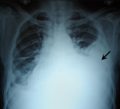Mediastinal shift

Editor-In-Chief: Prab R Tumpati, MD
Obesity, Sleep & Internal medicine
Founder, WikiMD Wellnesspedia &
W8MD's medical weight loss NYC, sleep center NYC
Philadelphia medical weight loss and Philadelphia sleep clinics
| Mediastinal shift | |
|---|---|

| |
| Synonyms | |
| Pronounce | N/A |
| Specialty | N/A |
| Symptoms | Dyspnea, chest pain, cyanosis, tracheal deviation |
| Complications | Cardiac arrest, respiratory failure |
| Onset | Sudden |
| Duration | Variable, depending on cause |
| Types | N/A |
| Causes | Tension pneumothorax, pleural effusion, atelectasis, tumors |
| Risks | Trauma, lung disease, surgery |
| Diagnosis | Chest X-ray, CT scan |
| Differential diagnosis | Pneumonia, pulmonary embolism, heart failure |
| Prevention | Proper management of underlying conditions |
| Treatment | Needle decompression, chest tube insertion, surgery |
| Medication | N/A |
| Prognosis | Depends on underlying cause and promptness of treatment |
| Frequency | Varies, more common in trauma settings |
| Deaths | N/A |
A condition involving the displacement of mediastinal structures
Mediastinal shift is a clinical condition characterized by the movement of the mediastinal structures, which include the heart, trachea, esophagus, and major blood vessels, from their normal central position within the thoracic cavity. This shift can occur due to various pathological processes and can have significant implications for respiratory and cardiovascular function.
Causes[edit]
Mediastinal shift can be caused by a variety of conditions, including:
- Pneumothorax: The presence of air in the pleural space can lead to lung collapse and subsequent shift of the mediastinum towards the unaffected side.
- Pleural effusion: Accumulation of fluid in the pleural cavity can push the mediastinum away from the affected side.
- Atelectasis: Collapse of lung tissue can cause the mediastinum to shift towards the affected side.
- Tumors: Large masses in the thoracic cavity, such as lung cancer or lymphoma, can displace mediastinal structures.
- Diaphragmatic hernia: Abnormal displacement of abdominal contents into the thoracic cavity can cause a shift.
Clinical Presentation[edit]
Patients with mediastinal shift may present with a variety of symptoms, depending on the underlying cause and severity of the shift. Common symptoms include:
- Dyspnea (shortness of breath)
- Cyanosis (bluish discoloration of the skin due to lack of oxygen)
- Tachycardia (rapid heart rate)
- Hypotension (low blood pressure)
- Tracheal deviation
Diagnosis[edit]
The diagnosis of mediastinal shift is typically made through imaging studies, such as:
- Chest X-ray: A simple and effective tool to visualize the position of the mediastinum and identify any shift.
- Computed tomography (CT) scan: Provides detailed images of the thoracic cavity and can help identify the underlying cause of the shift.
Management[edit]
The management of mediastinal shift depends on the underlying cause:
- In cases of tension pneumothorax, immediate needle decompression followed by chest tube insertion is required.
- For pleural effusion, therapeutic thoracentesis or chest tube drainage may be necessary.
- Surgical intervention may be required for tumors or diaphragmatic hernias causing the shift.
Prognosis[edit]
The prognosis of mediastinal shift varies widely depending on the underlying cause and the timeliness of treatment. Prompt recognition and management of the condition are crucial to prevent complications such as respiratory failure or cardiovascular collapse.
Gallery[edit]
Gallery[edit]
-
Mediastinal shift
-
Mediastinal shift
-
Mediastinal shift
-
Mediastinal shift
-
Mediastinal shift
-
Mediastinal shift
-
Mediastinal shift
-
Mediastinal shift
-
Mediastinal shift
-
Mediastinal shift
-
Mediastinal shift
See also[edit]
Ad. Transform your life with W8MD's Budget GLP-1 injections from $75


W8MD offers a medical weight loss program to lose weight in Philadelphia. Our physician-supervised medical weight loss provides:
- Weight loss injections in NYC (generic and brand names):
- Zepbound / Mounjaro, Wegovy / Ozempic, Saxenda
- Most insurances accepted or discounted self-pay rates. We will obtain insurance prior authorizations if needed.
- Generic GLP1 weight loss injections from $75 for the starting dose.
- Also offer prescription weight loss medications including Phentermine, Qsymia, Diethylpropion, Contrave etc.
NYC weight loss doctor appointmentsNYC weight loss doctor appointments
Start your NYC weight loss journey today at our NYC medical weight loss and Philadelphia medical weight loss clinics.
- Call 718-946-5500 to lose weight in NYC or for medical weight loss in Philadelphia 215-676-2334.
- Tags:NYC medical weight loss, Philadelphia lose weight Zepbound NYC, Budget GLP1 weight loss injections, Wegovy Philadelphia, Wegovy NYC, Philadelphia medical weight loss, Brookly weight loss and Wegovy NYC
|
WikiMD's Wellness Encyclopedia |
| Let Food Be Thy Medicine Medicine Thy Food - Hippocrates |
Medical Disclaimer: WikiMD is not a substitute for professional medical advice. The information on WikiMD is provided as an information resource only, may be incorrect, outdated or misleading, and is not to be used or relied on for any diagnostic or treatment purposes. Please consult your health care provider before making any healthcare decisions or for guidance about a specific medical condition. WikiMD expressly disclaims responsibility, and shall have no liability, for any damages, loss, injury, or liability whatsoever suffered as a result of your reliance on the information contained in this site. By visiting this site you agree to the foregoing terms and conditions, which may from time to time be changed or supplemented by WikiMD. If you do not agree to the foregoing terms and conditions, you should not enter or use this site. See full disclaimer.
Credits:Most images are courtesy of Wikimedia commons, and templates, categories Wikipedia, licensed under CC BY SA or similar.
Translate this page: - East Asian
中文,
日本,
한국어,
South Asian
हिन्दी,
தமிழ்,
తెలుగు,
Urdu,
ಕನ್ನಡ,
Southeast Asian
Indonesian,
Vietnamese,
Thai,
မြန်မာဘာသာ,
বাংলা
European
español,
Deutsch,
français,
Greek,
português do Brasil,
polski,
română,
русский,
Nederlands,
norsk,
svenska,
suomi,
Italian
Middle Eastern & African
عربى,
Turkish,
Persian,
Hebrew,
Afrikaans,
isiZulu,
Kiswahili,
Other
Bulgarian,
Hungarian,
Czech,
Swedish,
മലയാളം,
मराठी,
ਪੰਜਾਬੀ,
ગુજરાતી,
Portuguese,
Ukrainian









